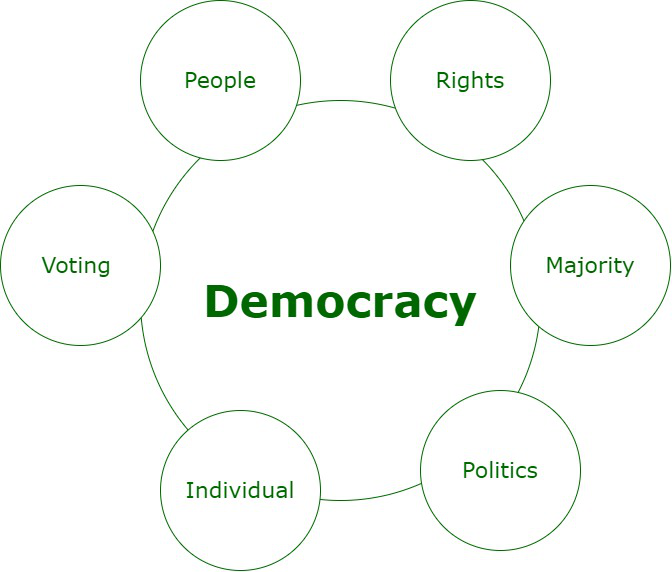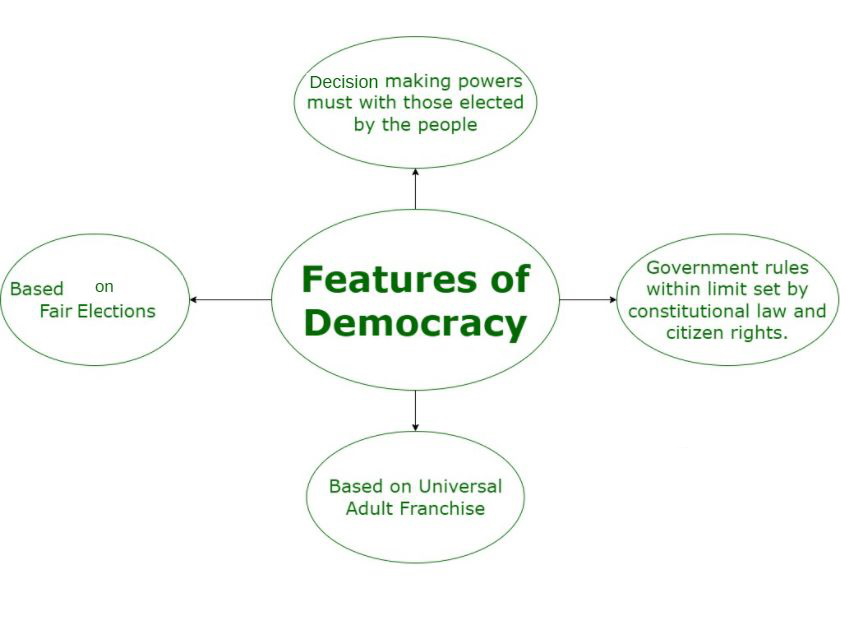民主的更广泛意义
民主是专制者由人民选举产生的一种权力形式。它提醒我们,自治是人民的基本规则。但是,如果我们无意中将此描述用作正当理由,我们将把几乎所有举行选举的政府都划定为共和国。在共和国里,最底层的解放力量应该在那些被人民标记的人身上。
共和国的特点
- 共和国必须建立在自由和公平的选举之上;目前掌权的人很有可能会失败。
- 在民主国家,每个成年公民都必须有一张选票,每张选票都必须有价值。
- 选举为人们提供了改变现任统治者的公平机会,前提是规则不符合他们。利用这个机会;以宪法和公民权利的基本规则来限制政府统治。
- 抵抗党在替代方案之前和之后都面临独立服务。
- 人民权威建立在政治平等的基本原则之上。

民主
民主的优点
- 共和政府是更好的司法管辖区,因为它是政府的额外负责人。
- 民主提高了决策的效率。
- 民主提供了处理争端和冲突的制度。
- 它适用于印度等国家。印度有多种语言、信仰和社会。印度共和国使庆祝多样性中的和谐成为可能。
- 民主是一种优越的专业管辖权形式,因为它允许我们纠正我们的错误假设。
- 民主提高了公民的尊严,因为它基于政治协调的原则,基于这样一种信念,即最贫穷和受教育程度最低的人与受过教育的富人享有同等地位。

民主的特点
良好民主的目标
- 当然,只有在没有人饿着睡的时候,这个国家才会有足够的民主。
- 每个公民都应该能够在制定决议中发挥平等的作用。每个公民都应该有相同的事实、入门教育、相同的安全和大量的承诺。
民主的更广泛意义
我们这个时代最熟悉的民主形式是代议制自治。在共和国家;全体人民不统治;允许多数人代表人民站稳脚跟,他们不直接统治;但通过他们显着的代表。它变得很有必要,因为
- 超现代的民主国家是基于大量人口的,坐下来合作一个想法或改革在物理上是不可行的。
- 即使有最微小的可能性,公民也没有精力、时间或愿望去选择和参与所有的想法。
它让我们对共和国有一个清晰但最低限度的了解。这种透明度有助于我们区分民主国家和非民主国家。但这不允许我们区分民主和良好的民主。为此,我们必须转向民主的更广泛含义。
每个民主国家都必须尝试确定大众判断的理想。这是以前和所有人都无法实现的。这需要不断的麻烦来挽救和加强流行的决策形式。我们作为公民所做的事情可以使我们的国家或多或少受欢迎。这是民主的长处和短处,国家的状况不取决于独裁者的所作所为,而是取决于我们作为公民的所作所为。
民主决策涉及所有受决策影响的人的参与和同意。那些不那么优越的人拥有与当权者相同的权力。此应用程序适用于政府、家庭或任何其他组织。因此,民主也是可以应用于任何其他生活领域的原则。它有助于在日常生活中的任何情况或情况下对等价进行排序,并有助于改善所有参与者的地位并带来平等。
这就是民主与其他不平等政府的区别。君主制、独裁或一党专政等不同形式的政府并不能容忍所有公民参与政治。大多数不受欢迎的政府都希望公民不参与政治。但民主取决于所有公民政治参与的功能。因此,对民主的研究应该集中在大众政治上。
Some challenges to proper functioning of Democracy:
- Social and Economic inequality: Discrimination based on religion, caste, and race causes social inequality.
- Communalism: Communalism is another challenge before democracy in India. Communal conflicts have taken place several times in different states.
- Consternation: Terrorism is posing a serious challenge to democracy in recent times. Terrorism has different facets and has political, religious, and international causes.
- Illiteracy: Basic education is the strength of democracy. A major part of the Indian population is made up of illiterate
- Casteism: The caste division in India is very clear. Discrimination and dissent are rampant in many parts of the country due to caste division.
- Rational Imbalance: The economic progress of a nation requires equally balanced development.
示例问题
问题 1. 赋予民主以意义并检查其特征。
回答:
The word ‘democracy‘ is derived from two Greek words ‘demo‘ which denotes people and ‘Crates‘ denotes power. Hence the literal meaning of democracy is ‘power of the people. One of the most infamous depictions of democracy is that of Abraham Lincoln, who says, “Democracy is the government of the people, by the people, and for the people.”
Features of democracy can be listed as follows:
- Democracy is a system of government in which autocrats are elected by the people on the principle of one person, one vote.
- Democracy should be based on self-government and fair choices, where those in power have a clear potential to be in the wrong place. The selectors should have a choice of campaigners.
- In a democracy, the right to take the final decision should be with the people tagged by the people.
问题二:民主面临独裁威胁。用合适的例子解释这个陈述。
回答:
Democracy remains intact when it comes to determining how to preserve checks and balances when legislatures do not get the chance, how to defend national elections amidst imprisonment, and how to assure that the administration is for the people.
For some democracies, delicate trade-offs can appear very important. Democratically tagged leaders such as Viktor Orban in Hungary have used the pandemic as a pretense to expand their power. Orban indefinitely suspended Congress and Option and is governed by decree. In Israel, Benjamin Netanyahu put the courts – which were set to investigate him on corruption charges – on recess. Bolivia halted its much-awaited options, which were last allowed to oust former president Evo Morales.
问题 3. 民主的论据是什么?
回答:
Democracy is a political system in which citizens exercise authority directly, or choose committees from amongst themselves. The people choose their leader. Representatives engage in an election and their members are chosen by selectors.
- Sovereignty is strong as dominant opinion can only be taken by tagged representatives and no external constraint is legal.
- Autonomous and fair choices present a fair choice for citizens to replace autocracy
- The option to replace autocratic rulers is available to all on an equal basis. One Man / One Vote / One Price.
- An autonomous administration is an additional accountable method of administration.
- Self-government improves the rate of deliverance.
- Self-government provides a system to deal with differences and conflicts.
问题 4:您如何从更广泛的民主意义中受益?
回答:
Democracy is a configuration of administration in which autocrats are tagged by the people. A common representative of all self-government is that the government is elected by the people.
- In a democratic government, the representation of a region in a country sits together to make decisions.
- Elections are held to elect representatives. Citizens have the right to choose their representatives.
- Democracy is an asset which can be applied in all walks of life.
问题五、民主的涵义随着时代的变迁如何扩展?
回答:
The meaning of democracy expanded with the changing times-
- It refers to knowing the form of government with just one principle which can be applied to all aspects of life like family, school.
- Democracy is also about the day day-to-day decisions we take in our lives.